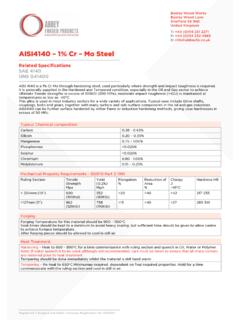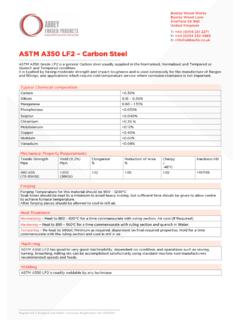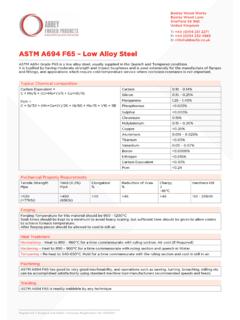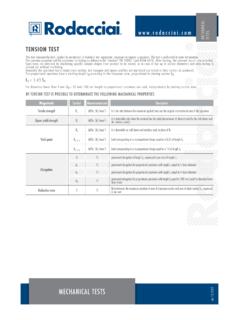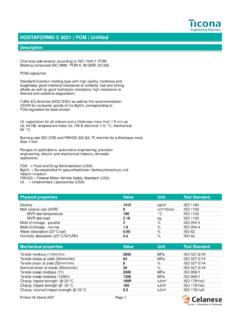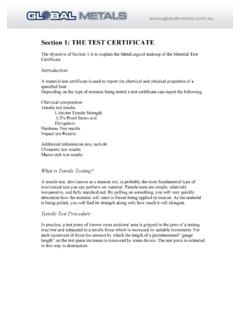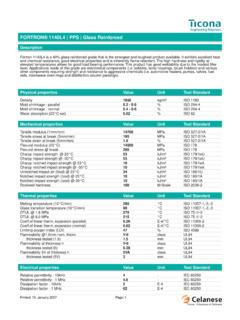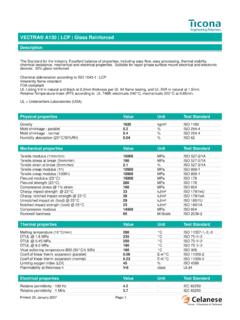Transcription of 655M13 – 3.25% Ni – Cr Case Hardening Steel
1 Beeley Wood Works Beeley Wood Lane Sheffield S6 1ND. United Kingdom T: +44 (0)114 231 2271. F: +44 (0)114 232 4983. E: 655M13 Ni Cr case Hardening Steel Related Specifications BS970-1955 EN36B. UNS G93106. DIN 14 NiCr4. 655M13 is a Nickel Chromium high hardenability case Hardening Steel , characterised by high core strength, excellent toughness and fatigue resistance, with case hardnesses up to 62 HRC when carburised, hardened and is usually supplied in the Annealed condition upto 255HB. Material can be used in the un-carburised condition as a high tensile Steel , which, when suitably hardened & tempered can be used for various applications requiring good tensile strength and toughness. General applications include all industry sectors for applications requiring high surface wear resistance, high core strength & impact properties. Typical uses include Gears, King Pins, Sprockets, Shafts etc. Typical Chemical composition (Values are maximums unless otherwise stated).
2 Carbon Silicon Manganese Phosphorous < Sulphur < Chromium Nickel Mechanical Property Requirements - Annealed condition Yield Tensile Strength Elongation Hardness 540 Mpa 700/770 Mpa 25% 255 HB Max Mechanical Property Requirements On Blank Carburised Test Piece As required by BS970 Part 3 1991. 655M13 . Test Bar Diameter Tensile Strength Elongation Charpy Impact Izod Impact Hardness Mpa % J Ftlbs HB. 19mm 1000 9 40 35 255 Max Typical Core Properties Carburised and Oil Hardened at 830oC. Section Size Yield Strength Tensile Strength Elongation Charpy Impact Hardness Mpa Mpa % J HB. 11mm 1030/1320 835 9 55 300-385. 30mm 930/1230 785 10 55 275-360. 63mm 880/1180 735 10 - 260-350. NOTE: This material can be used in the hardened and tempered (Un-carburised) condition for heavy duty shock resisting shafts and parts requiring tensile strengths in excess of 1000 Mpa in sections upto 200mm Forging Forging temperature for this material should be 850 1150oC.
3 Soaking times should be kept to a minimum to avoid heavy scale and excessive grain growth, suggest 15minutes per inch (25mm) of ruling section Registered in England and Wales. Company Registration No: 1644542. Heat Treatment Annealing Heat to 830 850oC ensuring sufficient time is allowed for the centre to achieve furnace temperature and hold for a time commensurate with the ruling section, followed by a slow furnace cool. Carburizing Pack, salt or gas carburizing at 900 950oC, hold for time commensurate with required case depth, followed by suitable Hardening and tempering to optimise core properties. Hardening Heat to 830 880oC and hold for time commensurate with ruling section, quench as required in Water, Oil or Air. Salt bath quench held at 150 200oC followed by Air cooling could be used as an alternative Note: This treatment is used for core refinement and should be followed by Tempering case Hardening Following core refining above, re-heat to 760 800oC, hold for time commensurate vwith ruling section and quench in oil.
4 Note: Material should be tempered immediately whilst still hand warm. Tempering Heat to 150 200oC for sufficient time to allow centre to achieve furnace temperature, and hold for 2hrs minimum, cool in still air. Machining Material in the annealed condition is readily machinable by milling, drilling, turning, tapping etc as required Welding In the annealed condition the material is readily weldable using low hydrogen electrodes, however following cooling the material should be stress relieved at 600-650oC. Note: Welding in the carburized or Heat Treated condition is not recommended. Registered in England and Wales. Company Registration No: 1644542.
